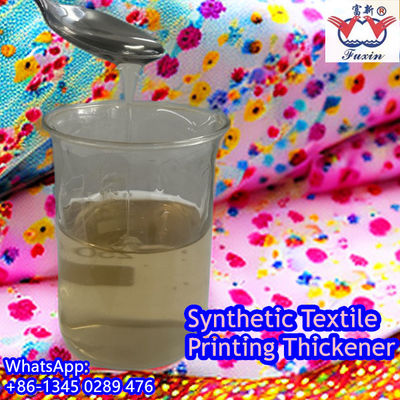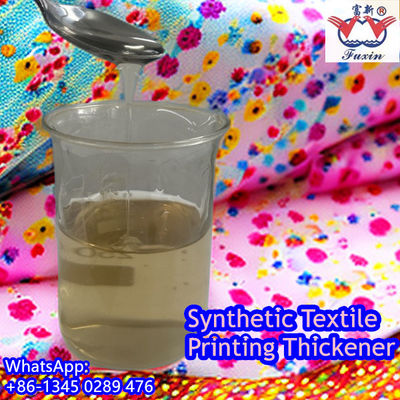CAS No. 9004-32-4 Chemical Auxiliary Agent Synthetic Thickener For Textile Printing
Product Description:
Textile Printing Paste is a specially formulated mixture used in the textile industry to create printed designs on fabric. It consists of pigments, dyes, thickeners, binders, and other additives that work together to achieve desired color, texture, and durability.
The primary purpose of Textile Printing Paste is to transfer colors onto fabric surfaces accurately and evenly. It provides the necessary viscoelastic properties to ensure that the paste adheres to the fabric during printing and maintains its shape and definition.
Thickeners, such as pigment printing thickeners or reactive printing thickeners, are added to the paste to control its viscosity and enhance its printing properties. Thickeners help to prevent color bleeding and ensure sharp and well-defined patterns and designs. Additionally, the thickeners can be used to provide proper color opacity and improve print-through.
Features:
Sodium Carboxymethyl Cellulose Aqueous Solution
Sodium carboxymethylcellulose aqueous solution is clear, transparent and homogenous and has good stability. Its viscosity won't be changed due to mechanical force, meaning it has no change in pump cycle or stirring. The solution can be put in storage tanks without worrying about changes due to temperature or bacteria, and can be taken out at any time according to production needs.
The solution has a strong viscosity and film-forming capability, which can form a smooth, abrasion and flexibility film on surface of warp, and offer the strength, the elasticity, and friction of the weaving machine, Ultimately creating more highly gripping fine fabrics and high-speed production.
The yarn processed with sodium carboxymethylcellulose aqueous solution has a soft texture, high gloss and is easily dried. It also doesn’t require treatments with chemicals or desizing agents for desizing purpose.
The fabric processed with the help of the solution is not prone to yellowing and mildew, thus reducing the amount of substandard or defective products due to bugs and dirt, which also negates damage from rats and worms.
Using sodium carboxymethyl cellulose aqueous solution is much simpler than the use of starch, and requires less precise machinery and control instruments, further simplifying the corporate’s workshop safety and sanitary conditions, allowing for easier maintenance of mechanical machinery, and greater production capacity of the weaving machine.
Advantages Synthetic Textile Printing Thickener:
1. Excellent chemical stability, suitable for cotton fabrics;
2. Fast paste making, good fluidity;
3. Good water retention, clear printing outline;
4. Get color deep, color light pure, color bright;
5. Good compatibility;
6. Can be used for Reactive printing;
7. Cost-effective, compared with sodium alginate, can directly reduce costs and improve economic efficiency.
Technical Parameters:
| Item |
D.S |
Viscosity, mPa·s
(Brookfield, 1% 20℃)
|
pH |
Moisture |
Size |
Color |
Package |
| Synthetic Textile Printing Thickener |
1.6 |
50 |
100 |
150 |
200 |
250 |
6.5-8.5 |
≤15% |
26-70 Mesh |
White /Brown |
25KG/500KG |
| 1.8 |
50 |
100 |
150 |
200 |
250 |
6.5-8.5 |
≤15% |
26-70 Mesh |
White /Brown |
25KG/500KG |
| 2.0 |
50 |
100 |
150 |
200 |
250 |
6.5-8.5 |
≤15% |
26-70 Mesh |
White /Brown |
25KG/500KG |
| 2.3 |
50 |
100 |
150 |
200 |
250 |
6.5-8.5 |
≤15% |
26-70 Mesh |
White /Brown |
25KG/500KG |

Applications:
Apparel Manufacturing: Textile Printing Paste is an essential component in the production of garments for apparel manufacturing. It can be used to add decorative patterns and designs on different types of fabrics, such as cotton, silk, polyester, and blends. The paste can be applied using various techniques, including screen printing, roller printing, and digital printing – making the garments more visually appealing and marketable.
Home Textiles: Textile Printing Paste is used to create home textile products like bed linens, curtains, upholstery fabrics, and tablecloths. It enables the printing of intricate and decorative patterns, giving these products a touch of personalization and adding to their visual appeal.
Promotional Products: Textile Printing Paste also finds application in creating custom-designed promotional products like bags, caps, and t-shirts. With it, logos, slogans, and graphics can be printed effectively – adding to their overall impact and recognition. The paste ensures that the prints are accurate and durable, ideal for branding and marketing.
Support and Services:
Technical Support and Service for Textile Printing Paste:
- Provide guidance, advice, and troubleshooting assistance for customers who are using Textile Printing Paste.
- Assist customers with product selection and installation of Textile Printing Paste.
- Offer technical support and consultation for customers who need help with product usage and maintenance of Textile Printing Paste.
- Provide technical training to customers on the proper use and maintenance of Textile Printing Paste.
- Respond promptly to customer inquiries and feedback on the performance of Textile Printing Paste.
Packing and Shipping:
Textile Printing Paste packaging and shipping includes the following:
- Packaging: Textile Printing Paste is securely packaged in airtight containers.
- Shipping: Textile Printing Paste is shipped through reputable carriers to ensure safe and timely delivery.

 Your message must be between 20-3,000 characters!
Your message must be between 20-3,000 characters! Please check your E-mail!
Please check your E-mail!  Your message must be between 20-3,000 characters!
Your message must be between 20-3,000 characters! Please check your E-mail!
Please check your E-mail! 



